Workers Life, Vol. 5, No. 3
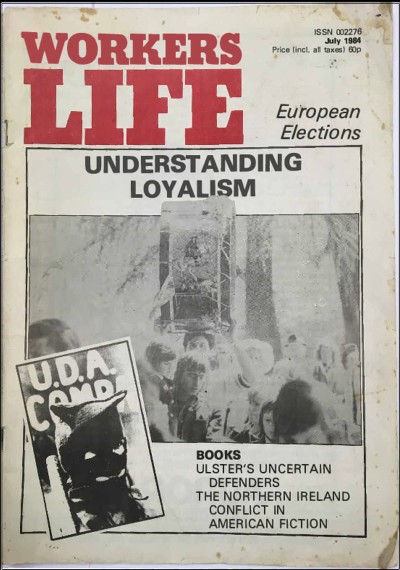
| Date: | 1984 |
|---|---|
| Organisation: | The Workers' Party |
| Publication: | Workers' Life |
| Issue: | Volume 5, Number 3 July 1984 |
Contributors:
Info | Paul Baker, Gerry Flynn, Kieran Furey, Paddy Gillan, F.J. Maguire, Gerald O'Reilly, Henry Patterson |
| Type: | Publication Issue |
| View: | View Document |
| Discuss: | Comments on this document |
| Subjects: | Ronald Reagan Visit to Ireland, 1984 European Parliament Election, 1984 |
Please note: The Irish Left Archive is provided as a non-commercial historical resource, open to all, and has reproduced this document as an accessible digital reference. Copyright remains with its original authors. If used on other sites, we would appreciate a link back and reference to The Irish Left Archive, in addition to the original creators. For re-publication, commercial, or other uses, please contact the original owners. If documents provided to The Irish Left Archive have been created for or added to other online archives, please inform us so sources can be credited.
Commentary From The Cedar Lounge Revolution
31st August 2020
Many thanks to the person who forwarded this to the Archive.
This edition of Workers Life covers a wide area of topics. Henry Patterson writes about ‘challenging some popular notions of Loyalism’, there’s a report on European Elections and another on the Reagan visit, there’s a piece on struggles to organise New York subway workers in the 1930s and another again on the Polisario Front. There’s also a piece on Kissinger and Central America.
The editorial engages with neutrality.
Irish neutrality has rarely been so popular and yet so threatened – right, left and centre – supports neutrality by which they mean not signing a military pact with either the US or the Soviet Union.
It argues that the Treaty of Rome and EEC membership constitutes the greatest threat. Intriguingly it argues:
…for most members states it is logical to put most stress on military unity; if only to loosen the bonds with the aggressive American nuclear missile policy forced on its NATO allies like Holland, Italy, Greece and Denmark.
It continues:
Since independence, most Irish politicians have viewed neutrality a a bargaining chip in a high stakes diplomatic game with Britain to secure unity with Northern Ireland. Even that prominent advocate of neutrality, Sean MacBride, was willing to consider NATO membership in return for British withdrawal from the North. That was thirty years ago, but it is only three years since Fianna Fail’s leader, Charles Haughey took the first tentative steps towards ending the country’s neutrality in the euphoria following his ‘Georgian teapot negotiations’ with Margaret Thatcher. The totality of relationships within and between these islands certainly included a military aspect, and he was tempted to shift policy on neutrality at the party’s Ard Fheis before a clamour of protest forced its abandonment. Only Thatcher’s expectation of total Irish support for the Falklands and a belated concern within Fianna Fail for the lives of Argentinian sailors prevented a military alliance with some NATO countries.
And it concludes:
A further step forward would require the development of a policy of positive neutrality. This would involve reaching beyond our shores, and joining with other neutral and non-aligned countries in actively working for world peace and disarmament. In today’s world, neutrality means a lot more than simply standing aloof from conflict; it means preventing it.
There are some other particular interesting snippets:
THE WORKERS’ PARTY last month sent the following message of condolence to the Central Committee of the Italian Communist Party on the death of Enrico Berlinguer, General Secretary P.C.I. ‘The Workers’ Party have just learned of the death of Comrade Enrico Berlinguer, General Secretary of the Communist Party of Italy. We send our deepest and comradely sympathy to all Italian Communists on this tragic happening. Comrade Berlinguer’s death is a blow, not alone to the Communist Party of Italy, but to progressive forces throughout the world. His outstanding contribution to the development and building of the Italian Communist Party as the major progressive force in Western Europe will be his enduring memorial.
And notable are a number of deeply critical pieces on Sinn Féin.
Otherwise, as usual with publications from this source very well produced in a magazine style format.
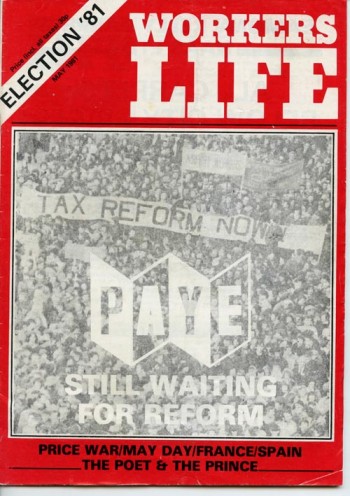
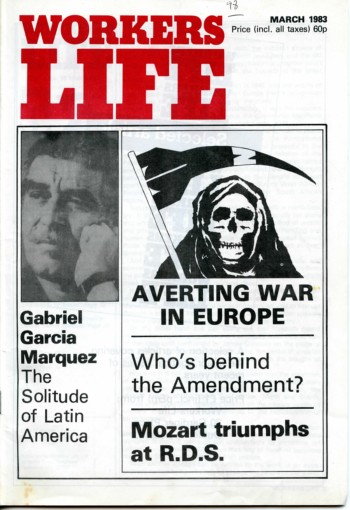
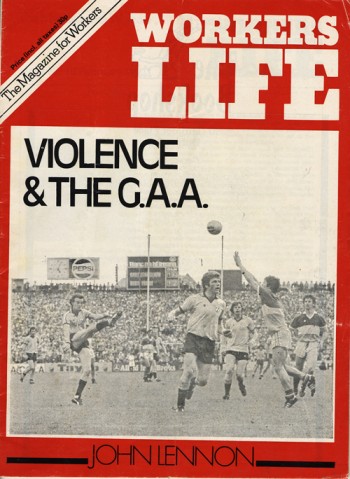
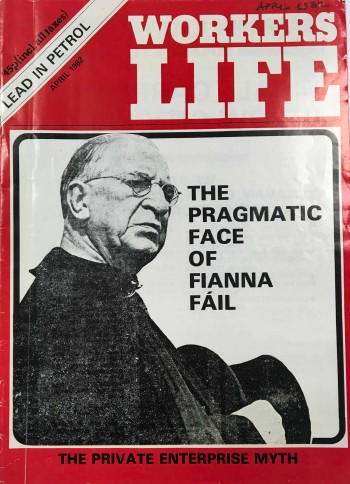
Comments
You can also join the discussion on The Cedar Lounge Revolution
No Comments yet.
Add a Comment
Comments can be formatted in Markdown format . Use the toolbar to apply the correct syntax to your comment. The basic formats are:
**Bold text**
Bold text
_Italic text_
Italic text
[A link](http://www.example.com)
A link